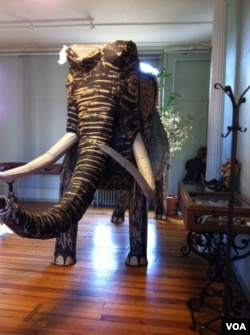After I was admitted as a transfer student by University of Virginia, I went to a send-off party hosted in Beijing by its alumni and the Office of Engagement for incoming undergraduate and graduate students, in order to learn more about my new school.
I was a finance major at my school in China, and did not see any reason to change my career path after changing my school. Especially not after attending the send-off party. It was held in one of the four most expensive clubs in Beijing and I kept hearing from all the alums and students there how “UVA’s Comm School [the McIntire School of Commerce] is the second best, if not the best, in the U.S.”
I would barely even have known that UVA has a liberal arts curriculum, which American universities in general are famous for, during that first encounter.
It was to get a social science requirement out of the way that I signed up for an anthropology class, Anthropology of Globalization, in my first semester at UVA. I did not have any clue what “anthropology” meant, but the word “globalization” attracted me.
The teacher was a graduate student who wore round frame glasses and worn-out jackets that seemed to be from several decades ago. His appearance gave me my first clue as to what an anthropologist might be like—people within this discipline seem to live in the past.
Instead of starting the class by explaining “anthropology” or “globalization,” he showed us a video called "First As Tragedy Then As Farce," in which a voiceover with an eastern European English accent accompanied fast-moving chalk drawings.
I barely understood what that video said because of this unfamiliar accent, but it sparked a classroom discussion about cultural imperialism afterwards that got me really excited. I even contributed a quick comment about the stir-fries McDonald’s in China offers.
Contributing one comment might not sound like a big deal, but that was the first time I ever participated in a classroom discussion, in the U.S. or in my college life.
It’s probably one of the wisest decisions I have made to take this class. I had never been exposed so extensively to cultures other than the one I grew up in until this class, and the anthropologists’ microscopic approach to everyday life and its cultural nuances really fascinated me.
The class materials made me feel that I was travelling around the globe—wandering in National Parks in the U.S., dancing with indigenous people in Taiwan, looking at graffiti in Cuba, chatting with coffee bean planters in Ethiopia. Besides, the thought-provoking comments made by classmates never fail to surprise me.
I decided to stick with anthropology longer, first by signing up for more anthropology classes, and eventually by declaring myself as an anthropology major on my 21st birthday. “Happy birthday, new anthropologist, and welcome!” said the department director as I handed her my major declaration form.
One of the innumerable interesting experiences as an international student studying anthropology is that you are always being observed by your professors. When they are interacting with you, they are also trying to learn about the culture you are from.
This desire to probe people’s cultures is an ingrained mindset of anthropologists. For example, one of my professors, an old but prominent American anthropologist, once asked me how my wedding would be—more traditional Chinese or more western.
Anthropologists often like to study cultures that are not their own because this discipline values the “outsider’s perspective” in looking at cultures. As an “insider” of Chinese culture, I take things for granted because I grew up in certain ways that I do not need explanations for. However, when my professor asks seemingly random or even weird questions about my culture, I am forced to take another look at my own culture from the “outsider” perspective.
I always wonder why exactly I fell in love with anthropology, almost at first sight, instead of following the paths of the students and alumni I met at the send-off party in 2011. I still have not figured it out, and I guess I don’t really need to. I just know that I enjoy spending time with anthropology and anthropologists. I like being analyzed and analyzing in return, I like working on my research on romance and gender, and I’m excited about preparing for an upcoming conference presentation on Asian pop music.
And if I ever find myself at another send-off party, I’ll be sure to tell the incoming students that there are so many options that they can study, and that I hope they find a subject they can fall in love with.




